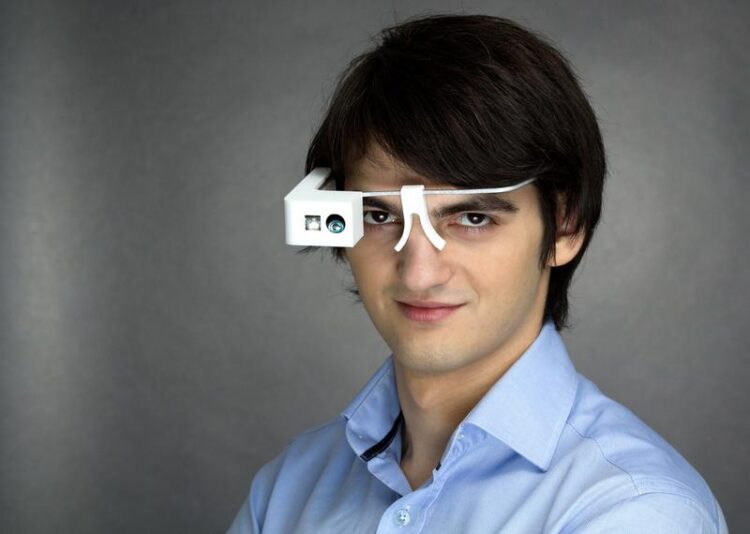High-tech glasses replace guide dog

Cornel Amariei is a graduate of Bremen's Constructor University and founder of the start-up .lumen. His technology of “the glasses that replace the guide dog” has just been patented in the USA.
Credit: Oana Graur
The technology of “the glasses that replace the guide dog” has just been patented in the USA. The European Union patent will follow, and it could well be introduced to the market during the course of next year. Cornel Amariei, a graduate of Bremen’s Constructor University and founder of the start-up .lumen, is convinced that these glasses will give people with blindness and visual impairments a whole new level of mobility and self-determination.
Around 40 million people worldwide are affected by blindness. Solutions to enable them to move freely are few and far between. If they want to go shopping or visit friends, they have to rely on a cane or the skills of a guide dog. Both options are rare, expensive and can help only very few. “This is where we come in,” Cornel said, “Our technology replicates the capabilities of a guide dog.”
The technology of the .lumen-glasses is similar to that of autonomous driving. Cameras record the environment, computer chips calculate the desired path, and the information is passed on to the wearer of the glasses via haptic signals and sounds. “Whereas a dog uses its body to control a person’s movement, with .lumen this is done via impulses from the headset,” he explained. “What this technology makes possible in combination with neuroscience is simply incredible,” enthused Cornel, who encountered impairments within his own family.
The European Innovation Council of the European Union is convinced by the glasses. It funded .lumen with 9.3 million Euros – the first Romanian company ever to receive such funding. Cornel grew up in Bucharest, Romania. He was able to read at the age of three and knew how to program at the age of seven. While still in school, he founded the country’s first robotics club and two companies.
To study electrical engineering and computer science, he was drawn to Bremen, Germany, to Constructor University, which was then called Jacobs University. “Without the impetus from the university, .lumen would not exist today,” Cornel said,. “Studying there was the best experience of my life.” He first presented the idea at the university’s Start-Up Competition in 2014. The jury saw its potential, and his team won. In his bachelor’s thesis, he also addressed the question of how visually impaired people can gain a visual impression of their surroundings.
Not only because of .lumen, the U.S. business magazine Forbes put him on the list of the 30 most influential young people under 30 in Europe in 2016. Further recognition such as being listed in the “Global Business Hall of Fame” or as one of the “Ten Outstanding Young Persons of the World” by the “Junior Chamber International” followed.
After graduating, Cornel initially worked as a senior engineer for the automotive supplier Continental, where he was quickly promoted to “Head of Innovation”; .lumen, however, was still on his mind. In 2020, the 29-year-old founded the start-up, partly because the technology had advanced to the point where the glasses weighed only a few hundred grams. Today, .lumen has more than 40 employees.
The glasses, which will initially be available in selected European countries and in the USA, will cost around 5,000 Euros. “Our aim is to offer them for free or at a low cost to those affected, if possible. It depends on the support system in the individual countries,” Cornel said.
At a later stage, .lumen will also be offered globally. Unlike guide dogs, the technology is scalable. The faster the technology develops, and the more copies of the glasses are produced, the cheaper they will become, Cornel is convinced. “We want to help as many people as possible,” he described the goal.
Weitere Informationen:
Media Contact
All latest news from the category: Information Technology
Here you can find a summary of innovations in the fields of information and data processing and up-to-date developments on IT equipment and hardware.
This area covers topics such as IT services, IT architectures, IT management and telecommunications.
Newest articles

Innovative 3D printed scaffolds offer new hope for bone healing
Researchers at the Institute for Bioengineering of Catalonia have developed novel 3D printed PLA-CaP scaffolds that promote blood vessel formation, ensuring better healing and regeneration of bone tissue. Bone is…

The surprising role of gut infection in Alzheimer’s disease
ASU- and Banner Alzheimer’s Institute-led study implicates link between a common virus and the disease, which travels from the gut to the brain and may be a target for antiviral…

Molecular gardening: New enzymes discovered for protein modification pruning
How deubiquitinases USP53 and USP54 cleave long polyubiquitin chains and how the former is linked to liver disease in children. Deubiquitinases (DUBs) are enzymes used by cells to trim protein…



